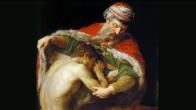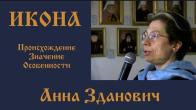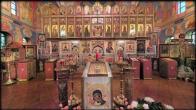You are here
Original Sin
The Roman Catholic dogma of the Immaculate Conception, whereof we spoke in the last discussion, contradicts the clear teaching of Sacred Scripture on the universality of original sin (Job 14:4-5, John 3:6 and many others).
The sin committed by our progenitors in paradise, with all its consequences, passed and passes from them to all their posterity. What the first people became after the Fall, such also till now are their descendants in the world. "Adam begat a son in his own likeness, after his image" (Genesis 5:3, KJV). Estrangement from God, the loss of grace, the distortion of God's image, the perversion and weakening of the bodily organism, which ends with death - here is Adam's sad legacy, received by each of us at our very appearance in the world. "As from an infected source there naturally flows an infected stream," teaches the Orthodox catechism, "so from an ancestor infected with sin, and hence mortal, there naturally proceeds a posterity infected with sin, and hence mortal."
Therefore, each of us can repeat after King David: "For behold, I was conceived in iniquities, and in sins did my mother bear me" (Psalm 50:7). The Apostle Paul expresses this thought still more clearly: "Wherefore, as by one man sin entered into the world, and death by sin; and so death passed upon all men, for that all have sinned" (Romans 5:12).
Inherited sin does not contradict either psychological or physiological laws, but, on the contrary, finds confirmation in those and other laws. The transmission of certain psychical and moral attributes, certain depraved inclinations and also physiological defects (for example, predisposition to certain diseases) from parents to children and later generations is a completely ordinary phenomenon. From a purely psychological point of view, it would have been unnatural if the damage to the moral nature of the progenitors of the human race through sin had remained only with them and had passed away without leaving a trace on their posterity, without touching it.
"Original sin is the damage to human nature [caused] by sin, which makes it incapable of fulfilling God's plan, God's design for man as the crown of the creation of the whole visible world", writes Archbishop Nathaniel ("Discussions on Sacred Scripture and on Faith", Volume 1, page 96 [in Russian]).
According to the teaching of the Roman Catholics, the essence of human nature did not change after the Fall; man remained such as he was created by God, only he was deprived of the supernatural gifts of grace (immortality of the body, the primordial righteousness and dominion over nature), in consequence of which he began to change for the worse in soul and body. In this deprivation of supernatural grace consisted the punishment of our progenitors, and after them of all men as well. Fallen man, according to the teaching of Catholic theologians, is a former courtier, who once was elevated and exalted by a special mercy of the king, and then for his fault was cast down from his high post and returned to his former condition.
Catholics exclude the Most Pure Virgin Mary from this notion. "According to the Roman Catholic notion", writes Vladyka Nathaniel, "original sin lies in the taking away by God from the first people, who had sinned, of the gift of 'original righteousness' (justitia originalis), which people had before the Fall, which was taken away from them after the commission of sin by them, but, by an exception to the general law, was given to the soul of the Virgin Mary at its introduction into the body. Therefore, the Virgin Mary is completely similar to Eve before the Fall, who had the gift of justitia originalis " ("Discussions on Sacred Scripture and on Faith", volume 1, page 98 [in Russian]).
According to the teaching of the Orthodox Church (from the first centuries and up to our days), all men are subject to original sin - all, including also the Mother of God. And all have to be redeemed by the sacrifice of the Son of God. The Most Holy Virgin herself numbers herself among the saved, calling God her Saviour, "and my spirit hath rejoiced in God my Saviour" (Luke 1:47). Sacred Scripture knows only one man who did not partake of original sin - the God-Man Christ Jesus, Who was conceived in a supernatural manner - by the Holy Spirit.
The Catholic view on original sin and on its consequences contradicts the clear testimonies of the word of God that point out the damage [caused] to man's very nature through the sin of our progenitors and the consequences of this sin, which show the violation of the natural order of human life. The Apostle Paul says: "For the good that I would I do not: but the evil which I would not, that I do. Now if I do that I would not, it is no more I that do it, but sin that dwelleth in me. I find then a law that, when I would do good, evil is present with me. For I delight in the law of God after the inward man: but I see another law in my members, warring against the law of my mind, and bringing me into captivity to the law of sin which is in my members" (Romans 7:19-23).
The infinite grandeur of the redeeming sacrifice of the Lord Jesus Christ is demeaned by the Catholic teaching on the Fall, and too great a significance is attributed to the participation of man himself in the work of salvation. Here the juridical approach characteristic of Catholics is again expressed: man not only receives salvation as something due and earned, but he can even perform more good works than he needs for acquiring eternal salvation.
Protestantism, in its teaching on original sin, as in many other points, fell into the opposite extreme. In its notion, man's Fall perverted human nature to such an extent that not even a trace of the powers and abilities bestowed by the Creator remained in him, and all his desires are directed solely toward what is evil and sinful. Man, according to Luther's expression, was turned, as it were, into a pillar of salt, like Lot's wife; he became a soulless block and even worse, because a block does not act and does not oppose, while man opposes the action of divine grace. It is true that many Protestants later acknowledged their extremeness in this teaching and some drew near even to the Orthodox view, but others, unfortunately, fell into rationalism and went as far as a complete rejection of original sin and even the very historical fact of the fall of our progenitors.
The Protestant view of original sin contradicts all those places in Sacred Scripture wherein an appeal to man's free will is contained for correction and salvation, and wherein, consequently, it is confirmed that man did not pervert his nature so much that he cannot take any part in the work of his salvation (see Matthew 16:24; 19:17-21).
© V. Potapov, 1996-98
Address of our Cathedral
Subscribe to our mailing list
While all the materials on this site are copyrighted, you may use them freely as long as you treat them
with respect and provide attribution on the Russian Orthodox Cathedral of St.John the Baptist of Washington DC.









